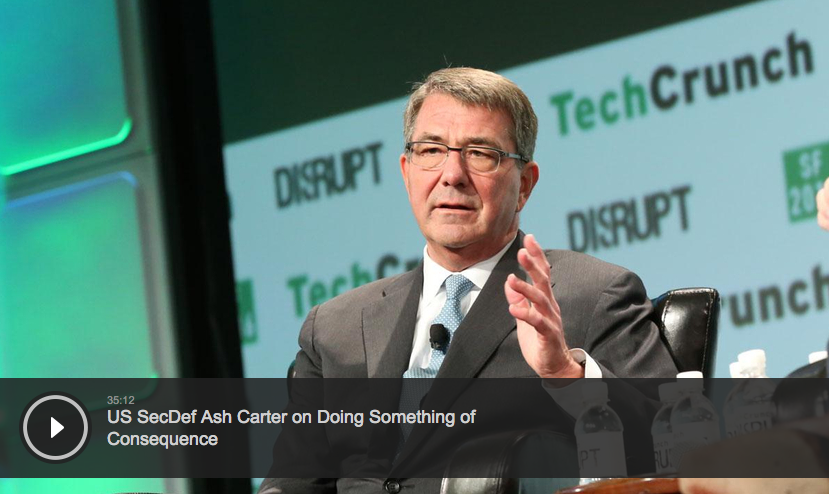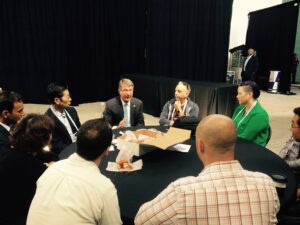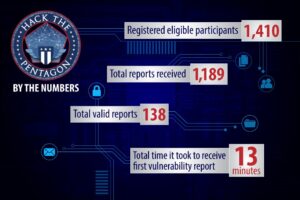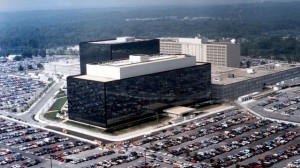SecDef Carter Wants YOU For The Defense Digital Service
Posted on

Defense Secretary Ashton Carter at the TechCrunch conference in San Francisco.
SAN FRANCISCO: Uncle Sam wants you, Defense Secretary Ash Carter told a skeptical tech community yesterday. It’s part of an all-out effort by the military’s civilian leader to get the technologically best and brightest to work with or even for the often-hidebound Pentagon.
Carter has created the Defense Innovation Unit Experimental (DIUX) and the Defense Digital Service, both of which report directly to him, he emphasized at the TechCrunch conference here. In essence, Carter is trying to build the same kind of bridge between the military and the information technology world that existed between the military and the physics community during the Cold War.
“When I started this business, I was doing physics,” Carter recounted. “I had no real knowledge or interest in public service, (but) somebody gave me a chance… ‘hey, Ash, just give it a try for one year, this is a really important problem.’…I did and I got hooked.”

Secretary Carter and Defense Digital Service director Chris Lynch (on Carter’s left) talk to potential recruits at TechCrunch in San Francisco.
“People are doing what they’re doing out here because they want to make an impact, they want to do something of consequence,” Carter told the TechCrunch audience. (The stock options help too). “If I come and meet you halfway, you can participate in something of really great consequence… providing security for our people.”
“They may not all want to serve in the military, but they may want to serve the public purpose,” he told reporters later.
The outbound lane on Carter’s new bridge is the DIUX, the much-publicized project to put Pentagon reps in Silicon Valley, Boston, Austin and (soon) other high-tech hotspots around the country. The inbound lane is the Defense Digital Service, which brings civilian techies into the Pentagon.
‘Somewhere here is Chris Lynch, who runs the Defense Digital Service,” Carter said, scanning the room at TechCrunch. DDS is “something where people can join for just one project or just a period of time,” he said. “I’ve got people from the best companies (who) come in and they do something meaningful,” be it upgrading GPS, improving cybersecurity or medical record sharing with the VA so veterans get their hard-earned benefits.

Chris Lynch, the casually dressed Director of the Defense Digital Service.
“A SWAT Team Of Nerds”
The Defense Digital Service is “a SWAT team of nerds,” said Chris Lynch, the DDS director. They spend a year or more at the Defense Department helping with particularly knotty and important problems. “On this particular trip,” explained to reporters on Secretary Carter’s plane en route to the TechCrunch conference, “we’re going to meet with some high-profile engineers to try to convince them to come out for at least a year to serve their country.”
To ease that transition, Lynch’s outfit is consciously counter-cultural. He’s made a point of wearing jeans and sneakers from day one. His team call themselves and any friends they find in the bureaucracy “the Rebel Alliance.”
The “service” is also awfully small. “We have about 18 people today,” Lynch said, and they are working on half-a-dozen projects.
“Our goal is to stay small and be very selective about the projects that we’re engaged in,” Lynch said. Defense agencies, services, and commands come to him to pitch their projects, but which ones DDS ultimately takes on is in large part guided by the personal interests, expertise, and passion of the individuals who join the service. The service doesn’t try replace the people already working on a problem for the Defense Department. Instead, DDS aims to help defense insiders over crucial hurdles with a well-timed infusion of outsider knowledge, then move on.
But how can less than 20 people make an impact on the two million-strong Department of Defense? “This model has been proven out many, many times over history, in particular at DoD,” Lynch said. “Small, highly empowered teams can actually make history and can change things.”
 Consider “Hack the Pentagon,” a highly publicized program offering rewards to anyone who reported a new vulnerability in Defense Department networks. Freelance “bug bounties” have become common practice in the tech world, but it’s profoundly antithetical to the rigidly controlled procedures of federal government. Insurgent officials inside the Defense Department had been wanting to do bounties, Lynch said, but it took the outsiders brought in by the Defense Digital Service to overcome institutional inertia and make it happen.
Consider “Hack the Pentagon,” a highly publicized program offering rewards to anyone who reported a new vulnerability in Defense Department networks. Freelance “bug bounties” have become common practice in the tech world, but it’s profoundly antithetical to the rigidly controlled procedures of federal government. Insurgent officials inside the Defense Department had been wanting to do bounties, Lynch said, but it took the outsiders brought in by the Defense Digital Service to overcome institutional inertia and make it happen.
“The Department of Defense got to pull off the first ever federal bug bounty,” Lynch said. “It’s probably the last place that a lot of people would have thought it would have happened.”
Now the effects are “cascading “across the federal government, , said D.J. Patil, the Chief Data Scientist at the White House, speaking alongside Lynch. Just as the Defense Digital Service was the catalyst to get the Defense Department to move, the Defense Department’s example is the catalyst getting other agencies to move.
“Since the Department of Defense launched this first-ever Hack the Pentagon bug bounty program, we have seen a number of other departments who have said, ‘oh, that was really good, we’re going to go do that too,’” said Patil.

NSA headquarters
Marijuana? Maybe. Treason? No.
The audience at TechCrunch seemed more than a little skeptical of Carter’s pitch. Their questions ranged from the National Security Agency to digital privacy, Edward Snowden — a traitor to many in the Pentagon but a hero to many here — and even drug use.
What if a really good engineer went to Burning Man and decided to “partake in some goodies,” the moderator asked. Would that disqualify them from working for the Pentagon?
“Times change,” Carter said. “The laws change respecting marijuana…. Yes, we can be flexible in that regard.”
The call to serve their country “animates a lot of people,” the secretary said, “but they want to know if it can be done in a way that’s consistent with their lifestyle, their values, with everything else that’s important in their lives.” The Pentagon needs to meet them halfway.

Poster on the wall of the Capital Factory in Austin during Sec. Carter’s visit.
But some things cannot change. Asked if the president should pardon Edward Snowden, the NSA contractor who illegally disclosed vast archives of highly classified material, Carter refused to comment on individual cases but came down emphatically against leaks.
“All of us who enjoy the public trust and handle classified information have the responsibility” to safeguard it, Carter said. That does not mean we have the right to tell the world secrets that we personally feel uncomfortable keeping. “To arrogate to oneself the authority to (disclose) something that’s been trusted to you,” he said, “that is something we can’t condone.”
The cultural divide is very real. The day after his talk at TechCrunch, Carter went to Austin to announce a new DIUX outpost to be hosted by the Capital Factory there. A poster on the wall quoted Buckminster Fuller on the need to “reorient world production away from weaponry,” and a local reporter asked whether techies working with DIUX should be worried their technology would be “militarized” or “misused.”
“We’re actually looking to reach out and build bridges to people who have not worked with us before — and yes, that includes people who have reservations,” Carter replied, “because I think when they get to know us, they’ll learn two things. The first is the United States military conducts itself in a way that I think makes people proud,” Carter said. “We’re extremely careful in what we do that we don’t harm civilians. No other military is as scrupulous.”
“The other thing they’ll discover,” Carter continued, “is the great satisfaction that comes from knowing, when you go to bed at night, that you spent your day doing something that contributes to the security of the country and a better world.”
Subscribe to our newsletter
Promotions, new products and sales. Directly to your inbox.
